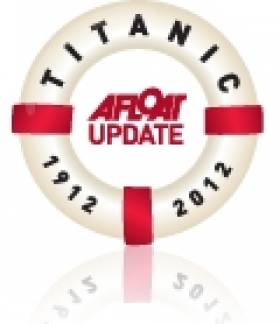Displaying items by tag: Restaurant river Seine boats
Tours of Titanic’s Tender SS Nomadic
#TITANIC'S TENDER - While all the attention is focused on the R.M.S. Titanic and the newly opened Titanic Belfast visitor experience, the White Star Line passenger tender SS Nomadic is only a stone's throw away from the venue, writes Jehan Ashmore.
Like the liner she was built by Harland & Wolff and her launch took place in 1911. She was commissioned by White Star Line as a 1st and 2nd class passenger tender for Titanic and sister Olympic.
The Nomadic carried out her duties based in Cherbourg, where she transferred passengers to the Titanic on her only call to the Normandy port. As such the vessel which is registered in the French port, is the last surviving White Star Line vessel in the world and the only remaining authentic link to the ill-fated liner.
Decades later, the Nomadic became a floating restaurant on the River Seine in Paris close to the Eiffel Tower, where the venture which started in 1977 remained formore than twenty years.
The ageing vessel faced new safety regulations threatening her fate which ultimately led to her being seized in 2002. She was then offered for sale and then followed a court action for her to be scrapped but a campaign was raised to save the historic vessel which succeeded in her securement.
At 95 years old she was towed by barge back to her builder's birthplace in Belfast in 2006. Now that she is over a century old the vessel is currently undergoing restoration by the SS Nomadic Charitable Trust. She is dry-docked in the Hamilton Dock which adjoins the new iconic landmark of the Titanic Belfast building within the developing Titanic Quarter.
Yesterday 'hard-hat' tours began of the preserved liner tender and it is essential to note that tickets are to be 'pre-booked' with the last tour on 15th April. Daily tours are at 10.30, 12 noon, 2pm and the last tour is 3.30pm. To ensure availability visit: www.nomadicbelfast.com/book-a-tour
For further information about the various visitor attractions and events click the following headings, to be directed to the relevant websites.
The history of the S.S. Nomadic
Titanic Belfast Festival (31 March -22 April)
Titanic Belfast Visitor Experience
Following yesterday's inaugural cruise call to Belfast this year of Balmoral as previously reported the Fred. Olsen Cruise Lines vessel was making a cruise in memory of the liner. To see the list of the other cruiseships calling to the city, click HERE.
- RMS Titanic
- SS Nomadic
- White Star Line
- Nomadic Charitble Trust
- Harland & Wolff
- H&W
- Cherbourg
- White Star Line passenger tenders
- Hamilton Dock, Belfast
- Port of Belfast
- Belfast Lough News
- Cruise ships
- Cruise Liners
- Balmoral
- Fred. Olsen Cruise Lines
- Restaurant river Seine boats
- Titanic Belfast
- Titanic Quater
- Titanic Belfast Festival
- RMS Olympic
























































